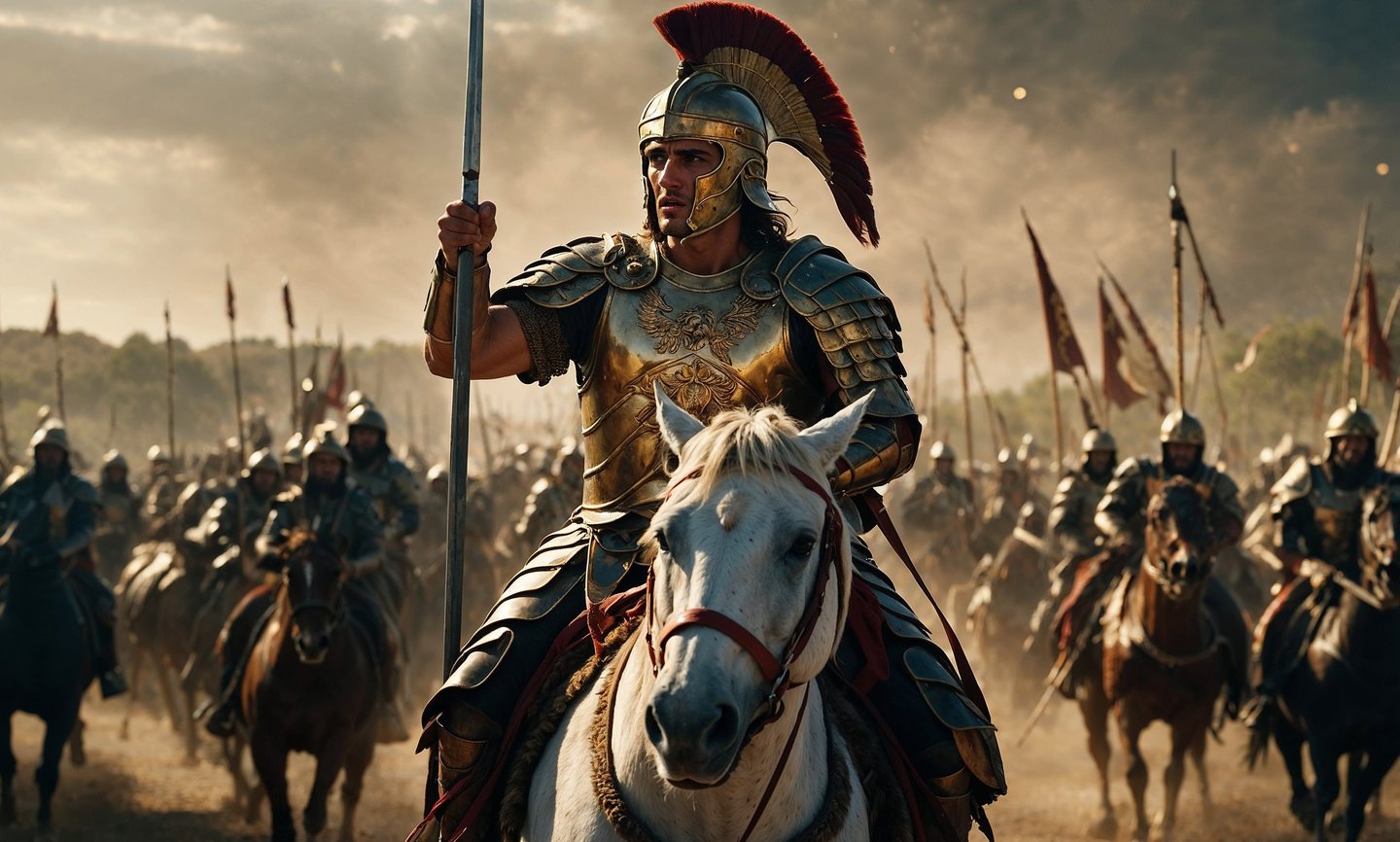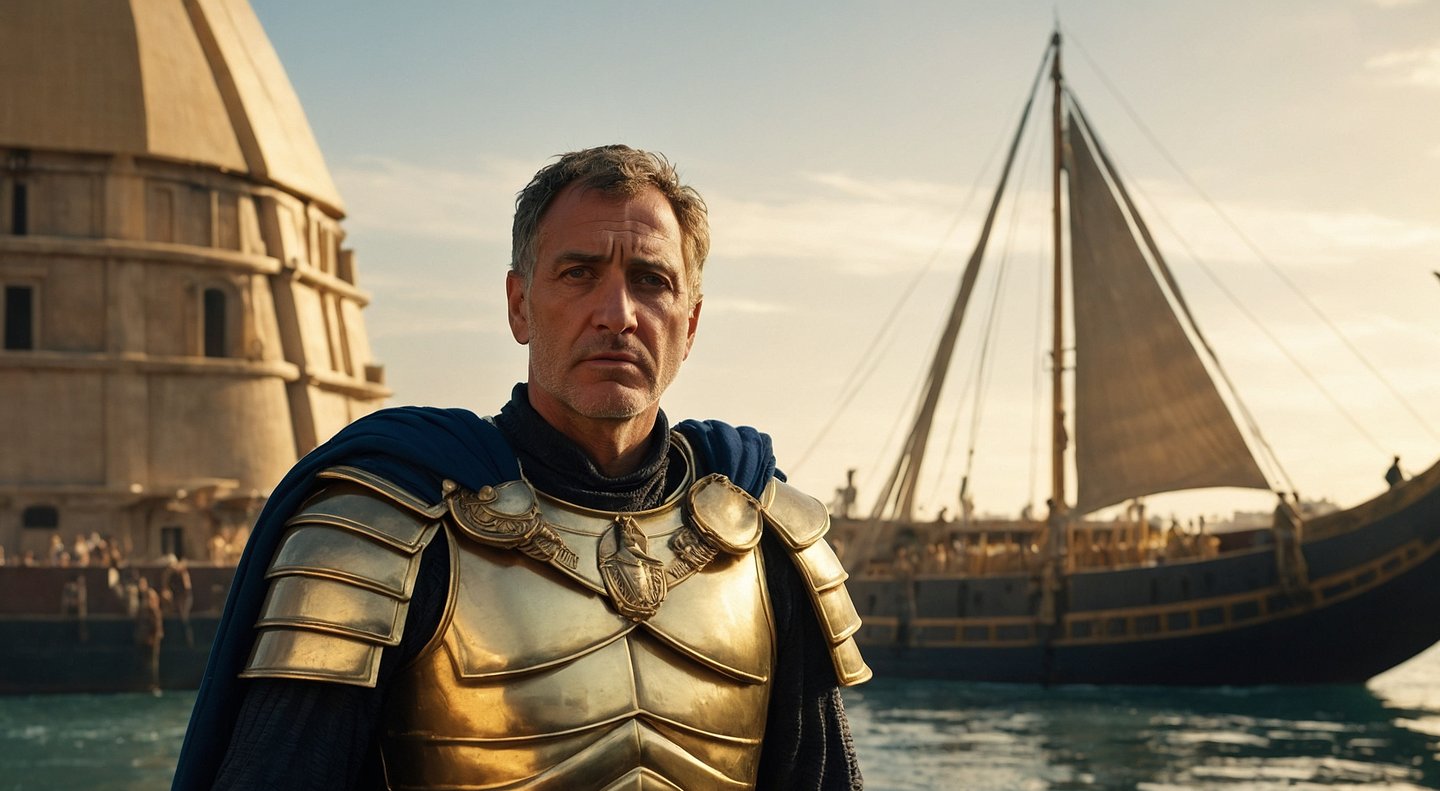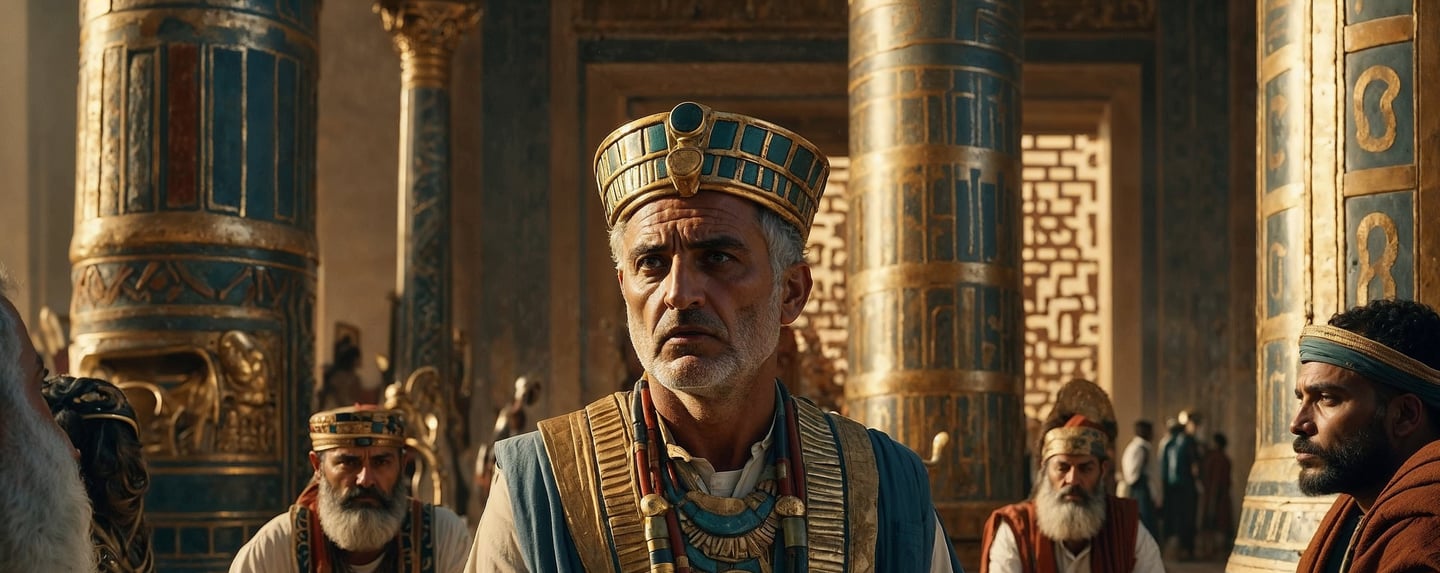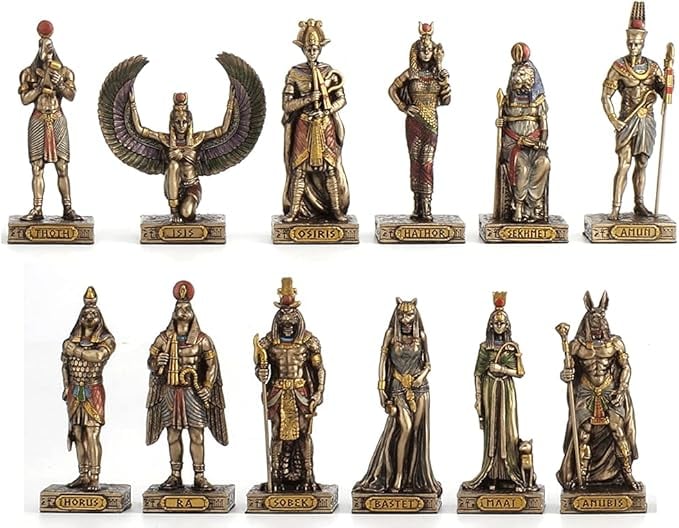Ptolemy I Soter
Ptolemy I Soter transformed himself from a trusted general of Alexander the Great, to the founder of Egypt’s Ptolemaic Dynasty. His meteoric rise is a tale of unparalleled strategy, bold ambition, and calculated leadership. His reign shaped Egypt’s future, leaving an enduring mark on ancient history and the world beyond.
HISTORICAL FIGURESEMPIRES AND DYNASTIESANCIENT CIVILIZATIONS
Michael Keller
12/9/202413 min read
Ptolemy I Soter
"Ptolemy, son of Lagus, was a man of great courage and intelligence, and he had been bred up in the habits of war from his earliest youth." – Arrian, The Campaigns of Alexander. [1]
In the annals of history, few figures emerge as both witness and architect to an age of extraordinary change. Ptolemy I Soter was a man whose life intertwined with one of the most celebrated empires of the ancient world. As a trusted companion of Alexander the Great, Ptolemy stood on the front lines of conquest and ambition, navigating the chaos that followed a world reshaped. But his story is not one of mere survival, it is one of vision, resilience, and a legacy that would echo through centuries.
Born around 367 BCE, Ptolemy I Soter entered a world shaped by ambition and conflict. From his earliest days, he was born into the Macedonian aristocracy, a backdrop that would shape his future. [2] Raised amidst the turbulent period of Macedonian history, Ptolemy grew up during an age defined by military campaigns and political strife. As a young man, he joined the royal court of King Philip II, and it was there that he would first encounter a figure whose ambitions would forever intertwine with his own. His rise to prominence began through his military training, a crucial part of his upbringing, during a time when the Macedonian kingdom was preparing to expand its influence across the known world. [3] Though the specifics of his early years are not well-documented, it is clear that Ptolemy’s position as a nobleman and his eventual connection to Alexander set the stage for a future that would reach far beyond his noble birth.
A Loyal Companion to Alexander
Ptolemy’s connection with Alexander the Great was far more than that of a simple companion, it was a bond forged in the fires of battle, a relationship built on trust, shared ambitions, and mutual respect. [4] Although Ptolemy’s early years at court are not fully documented, it’s clear that he grew up alongside Alexander in the royal Macedonian household. Both young men were shaped by the same tutelage and military training, with Alexander’s education under the philosopher Aristotle being a significant influence. As they matured, Ptolemy’s role in Alexander’s life became increasingly important. He was not just a loyal ally but also a trusted confidant, often by Alexander’s side through thick and thin.
Though Ptolemy’s military experience began during Philip II’s reign, it was after Alexander ascended to the throne following his father’s assassination that their bond truly solidified. Ptolemy played a key role in securing Alexander’s claim to the throne, navigating the political tensions and opposition that arose in the wake of Philip’s death. [5] His military acumen, as well as his personal loyalty to Alexander, made him an invaluable asset during this critical time. From there, Ptolemy’s status in the royal court grew, as did his role in the Macedonian army. He became a steadfast bodyguard and advisor, offering counsel to Alexander in moments of strategic importance.




Throughout Alexander’s campaigns, Ptolemy’s place within the inner circle was firmly secured. He was a constant presence during the grueling marches across Asia and into India, often tasked with critical military operations. [6] His intelligence and bravery on the battlefield were evident as he proved himself a master tactician. With every new challenge that Alexander faced, be it navigating the treacherous terrain of Persia or confronting the formidable forces of the Indian subcontinent, Ptolemy was there, standing beside his king and friend, offering both strength and wisdom.
This bond, one of unwavering loyalty and deep friendship, would not only shape the course of their military campaigns but also influence the course of history itself. As Alexander’s empire reached its zenith, it was Ptolemy who played a key role in ensuring the security and stability of the Macedonian forces in the empire’s more distant territories. [7] His presence was not just a reminder of their shared past but also a symbol of the enduring loyalty that would define Ptolemy’s future, long after Alexander’s death.
The Rise of a King
When Alexander the Great died suddenly in 323 BCE at the age of 32, the world was shaken. His death, though mysterious, sent ripples through his vast empire, which stretched from Greece to the edges of India. While the exact cause of Alexander’s death remains a topic of debate (some say it was a fever, others suspect poison) one thing was certain: it left a power vacuum that no one could have predicted. [8] As Alexander’s body was prepared for burial, his empire stood on the brink of chaos, and Ptolemy, ever the loyal companion, found himself thrust into a new and uncertain role.
Ptolemy’s Personal Life
While Ptolemy’s reign was marked by political maneuvering, military campaigns, and the transformation of Egypt into a cultural powerhouse, his personal life was no less significant. Beneath the crown and the burdens of leadership, Ptolemy’s marriage to Berenice, a Macedonian noblewoman, played a crucial role in shaping the future of his dynasty. [17]
Berenice, like Ptolemy, came from a family with noble roots. Their union, which solidified political and familial alliances, was a strategic match within the world of Macedonian royalty. Though the details of their relationship remain somewhat obscure, it is clear that Berenice was more than just a queen consort. She was an influential figure in her own right, standing alongside her husband as they ruled Egypt.
Together, Ptolemy and Berenice had several children, ensuring the continuation of the Ptolemaic line. Their eldest son, Ptolemy II Philadelphus, would eventually inherit the throne and expand upon his father’s achievements. Under his rule, Egypt would see further prosperity, including the construction of more monumental structures and the continued flourishing of Alexandria as a center of culture and intellect. But it was not just his children who played pivotal roles in the kingdom's future. Ptolemy’s relationship with his wife and the political alliances it brought were foundational to maintaining the power and stability of the Ptolemaic dynasty. [18]
In a time when royal marriages were often used to cement political power, Berenice’s role extended beyond the traditional duties of a queen. She was a mother, an advisor, and a partner in the complex world of governance. Together, they navigated the intricate relationships with other Hellenistic rulers and ensured that Egypt remained a dominant force in the Mediterranean world.
Ptolemy’s family life was also marked by the personal challenges of ruling a vast empire. The pressures of maintaining alliances, managing royal succession, and overseeing the ambitions of his children would not have been easy, yet Ptolemy’s ability to navigate these challenges demonstrated his capacity not just as a ruler, but as a patriarch. His children, particularly his son, were trained to follow in his footsteps, with the expectation that they would carry forward the work he had started.
While we may not know every intimate detail of Ptolemy's personal relationships, the strength of his family, both through his marriage to Berenice and through his children, was undeniably important to the success and stability of his rule. Their lives, intertwined with the fate of Egypt, shaped the future of the Ptolemaic dynasty, ensuring that Ptolemy’s vision for Egypt would endure well beyond his reign.
A captivating narrative that connects the stories of ancient cultures, tracing events across Europe, the Middle East, and China.
In this first book of a groundbreaking series, Susan Wise Bauer blends sweeping historical overviews with personal stories that bring the past to life. With detailed maps, timelines, and firsthand accounts, she ties together the actions of rulers and the lives of the people they governed.
The result is a vivid and engaging portrayal of humanity’s shared journey through time.
Ptolemy had been by Alexander’s side throughout the king’s most critical moments, including his final days. As Alexander's health deteriorated, Ptolemy, like many others in the king’s inner circle, must have felt the weight of the inevitable, yet even in the face of loss, he knew the empire could not remain intact without a ruler. The question of succession loomed large, and while Alexander’s death left no clear heir to the throne, Ptolemy’s position in the royal court made him an immediate contender for power. His friendship with Alexander had run deep, but the turbulent political environment demanded a shift from loyal companion to ambitious leader.
In the aftermath of Alexander’s death, the empire fractured into warring factions. Ptolemy, who was appointed to govern Egypt quickly recognized the region’s strategic value and seized the opportunity to establish his rule. [9] As the satrap of Egypt, he held one of the richest and most crucial territories of the empire. With political skill and military precision, he asserted control over Egypt, navigating the complex power struggles with rivals who sought to claim pieces of the empire. Ptolemy’s determination and tactical brilliance shone as he consolidated power in the eastern Mediterranean, securing Egypt as his base.
In 312 BCE, during the Battle of Gaza, Ptolemy faced off against Demetrius Poliorcetes, one of Alexander’s former generals, who sought to disrupt Ptolemy’s growing influence in the region. [10] In a decisive victory, Ptolemy outmaneuvered Demetrius, solidifying his control over Egypt and the eastern Mediterranean. This victory was a turning point that cemented Ptolemy’s reputation as a leader of strength and cunning.
Seven years later, in 305 BCE, Ptolemy declared himself king of Egypt, an audacious move that was essential to his vision of the future. [11] By doing so, he laid the foundation for the Ptolemaic Dynasty, which would rule Egypt for nearly three centuries. Though the declaration was met with opposition, Ptolemy’s resolve proved stronger than that of his adversaries. His victory and subsequent rise to kingship marked a defining moment in his career.
Beneath the political maneuvering and military conquests, however, Ptolemy's personal loss lingered. The man who had shared countless victories with Alexander now had to navigate a fractured world without his closest companion. What had begun as an era of joint ambition had now transformed into one of survival, where Ptolemy would not only fight to honor his friend’s memory but also to carve out his own legacy in the world.
A Vision for Egypt
While many of Alexander’s successors sought to maintain control through military might, Ptolemy had a broader vision for the future of his kingdom. Egypt, with its rich history and strategic importance, offered a fertile ground for both political power and cultural renewal. Ptolemy understood that a strong empire was not just built on the might of its armies but also on the wisdom of its scholars and the prosperity of its people. With this in mind, he set out to transform Egypt into a beacon of intellectual and cultural excellence. His greatest achievement in this area was the flourishing of Alexandria, the city founded by Alexander, which would come to symbolize Ptolemy’s vision for a unified and enlightened Mediterranean world.
Alexandria quickly became a magnet for the brightest minds of the ancient world. Scholars, philosophers, and thinkers from across Greece, Persia, India, and Egypt were drawn to its vibrant intellectual community. [12] Among the most notable figures to make their way to Alexandria was the mathematician Euclid. Known for his foundational work in geometry, Euclid’s Elements became one of the most influential works in the history of mathematics, shaping the discipline for centuries to come. His presence in Alexandria highlighted Ptolemy’s commitment to cultivating knowledge and learning at the highest levels. [13]
But Euclid was not the only intellectual to contribute to Alexandria’s reputation as a center of learning. Other luminaries such as the astronomer Claudius Ptolemy (no relation to the king) would later help shape the future of science and astronomy. Philosophers, historians, and physicians also found their place within the city’s walls, each contributing to a growing pool of knowledge. Alexandria’s famed Museum, a research institution where scholars could live and work, became one of the first centers of academic excellence in the world. [14]
Perhaps Ptolemy’s most enduring contribution to Alexandria’s intellectual culture was the creation of the Library of Alexandria. While the exact details of its founding are unclear, it is widely believed that Ptolemy commissioned the library as a grand repository of knowledge. [15] The Library sought to collect all the works of the known world, from philosophical treatises to scientific research, and served as a symbol of Ptolemy’s commitment to preserving and advancing knowledge. Though its eventual destruction in antiquity is shrouded in mystery, the Library’s influence endured long after its physical demise. For centuries, scholars continued to reference its works, and the ideal of the library itself became a model for future institutions of learning.
The Library’s vast collection (rumored to have housed hundreds of thousands of scrolls) was considered one of the wonders of the ancient world. Its size and the breadth of knowledge it contained were staggering, encompassing everything from mathematics and astronomy to literature and philosophy. [16] Though the original Library no longer stands, its legacy as a center for learning has left an indelible mark on the world. The idea of Alexandria as a hub of intellectual activity under Ptolemy remains a testament to his vision of an empire not only defined by military power but by cultural and intellectual achievement. This vision turned Egypt into a beacon of enlightenment, one that would influence generations to come.
Through the establishment of Alexandria as a cultural and intellectual center, Ptolemy laid the groundwork for a future where knowledge and learning would continue to thrive—long after his reign had ended.hat had guided their every move.
As you reflect on Ptolemy’s journey, what qualities do you think are most crucial in turning ambition into lasting achievement?
Share your thoughts with us. For feedback or inquiries, email: contact@archivinghistory.com. We look forward to hearing from you!
Join Archiving History as we journey through time! Want to stay-tuned for our next thrilling post? Subscribe!
Follow us on Facebook, Instagram, YouTube and TikTok for captivating insights, engaging content, and a deeper dive into the fascinating world of history.
Source(s):
1. Arrian, The Campaigns of Alexander, trans. E. J. Chinnock (London: William Heinemann, 1893), 108.
2. Heckel, Waldemar. The Wars of Alexander the Great: 336–323 BC. Oxford: Osprey Publishing, 2006, 4.
3. Green, Peter. Alexander of Macedon, 356–323 B.C.: A Historical Biography. Berkeley: University of California Press, 1991, 57.
4. Plutarch, The Life of Alexander, trans. John Dryden (New York: Modern Library, 2001), 98.
5. Diodorus Siculus, Library of History, vol. 17, trans. C. H. Oldfather (Cambridge, MA: Harvard University Press, 1935), 33.
6. Arrian, Anabasis of Alexander, trans. Aubrey de Sélincourt (Harmondsworth, England: Penguin Books, 1971), 219.
7. Lane Fox, Robin. Alexander the Great. London: Penguin Books, 2004, 594.
8. Green, Peter. Alexander of Macedon, 356–323 B.C.: A Historical Biography, 592.
9. Diodorus Siculus, Library of History, vol. 17, trans. C. H. Oldfather, 39.
10. Plutarch, The Life of Demetrius, trans. John Dryden (London: Modern Library, 2001), 70.
11. Heckel, Waldemar. The Wars of Alexander the Great: 336–323 BC, 168.
12. Bagnall, Roger S. Egypt in the Hellenistic World. Cambridge: Cambridge University Press, 2009, 213.
13. Heath, Thomas L. The Thirteen Books of Euclid's Elements. Cambridge: Cambridge University Press, 1925, 38.
14. Toomer, G. J. Ptolemy’s Almagest. New York: Springer, 1998, 5.
15. Macleod, Roy. The Library of Alexandria: Centre of Learning in the Ancient World. London: I.B. Tauris, 2000, 75.
16. Canfora, Luciano. The Vanished Library: A Wonder of the Ancient World. Berkeley: University of California Press, 1990, 112.
17. Bowman, Alan K. Egypt after the Pharaohs: 332 BC–AD 642. Berkeley: University of California Press, 2008, 47.
18. "Grainger, John D. The World of the Ptolemies. London: Routledge, 1994, 61.
19. Plutarch, The Life of Ptolemy, trans. John Dryden (London: Modern Library, 2001), 45.
20.Bowman, Alan K. Egypt after the Pharaohs: 332 BC–AD 642, 70.


12 Egyptian Gods miniature Sculptures Crafted By Master Artisan
Made From High Quality Designer Resin And Hand Painted Finish
Average Size 1 1/4" 1 1/4" 3 1/2" (W*L*H)
Intricately Sculpted and Lightly Colored Finish Makes this Statue a Stand Out Piece
A captivating narrative that connects the stories of ancient cultures, tracing events across Europe, the Middle East, and China.
In this first book of a groundbreaking series, Susan Wise Bauer blends sweeping historical overviews with personal stories that bring the past to life. With detailed maps, timelines, and firsthand accounts, she ties together the actions of rulers and the lives of the people they governed.
The result is a vivid and engaging portrayal of humanity’s shared journey through time.




A Skilled Politician and Patron of the Arts
Ptolemy’s reign stood out for its blend of military strength and cultural patronage. While his campaigns, including the successful invasion of Syria, expanded his kingdom, his true genius lay in his political foresight. As Plutarch noted, "Ptolemy was a man of great sagacity and cunning, and he knew how to wait for the right moment to strike," allowing him to navigate the volatile post-Alexander world with skill. [19]
Ptolemy’s court in Alexandria became a vibrant center for scholars, artists, and thinkers. His ability to blend military and cultural prowess not only ensured the survival of his dynasty but also set Egypt on a path of lasting prominence in the ancient world.
As we reflect on his remarkable achievements, it’s clear that Ptolemy I Soter’s impact reached far beyond his reign, influencing the course of history in ways still felt today.
Remembering Ptolemy I Soter
By the time of his death, Ptolemy had transformed Egypt into a powerful and prosperous kingdom, securing its position as one of the ancient world’s great centers of culture and intellect. [20] His accomplishments as a military leader, skilled statesman, and patron of the arts left an indelible mark on history. Through his foresight and determination, Ptolemy not only ensured the survival of his dynasty but also helped shape the future of the Mediterranean world. Even now, his influence can still be traced in the cultural and intellectual advancements he championed.







